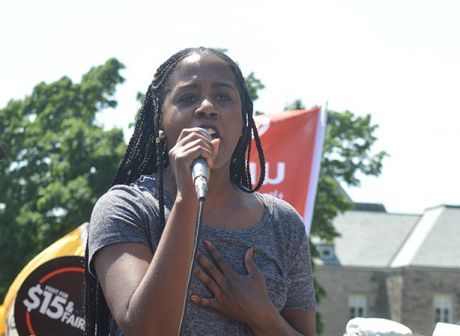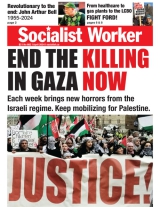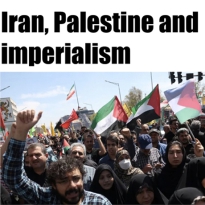Fight Ford!
You are here
Interview: Sandy Hudson on the fight against Ford

July 11, 2018
On June 16 thousands of Ontarians took to the streets to demand that decent work be protected. This includes the new labour protections brought in under Bill 148 including equal pay for equal work, new temp agency regulations, paid sick days, paid emergency leave, and the increased minimum wage—now at $14/hour. Doug Ford announced during his campaign that he would be scrapping the planned raise to $15/hour, despite the fact that the majority of Ontarians support the policy, including 40% of Conservative voters. In addition to this, the entire PC party voted against Bill 148 in 2017, and star PC candidate Christine Elliot made it clear on Metro Morning two days before the election that other sections of Bill 148 would be dismantled. It is notable that Ford did not mention his plan to cancel the $15 wage from a podium during the debates, likely due to the fact that it is a popular policy.
Reading this weakness and understanding the need to send a loud message immediately after the election, the Fight for 15 and Fairness and the Ontario Federation of Labour began organizing the rally over a month before June 16. Speakers at the rally included investigative journalist and climate change activist Naomi Klein, Dr. Ritika Goel of the Decent Work and Health Network, and Gobinder Singh Randhawa, Chair of the Ontario Sikhs and Gurdwara Council.
The following is an interview with Sandy Hudson, co-founder of Black Lives Matter Toronto, who also addressed the rally at the steps of the legislature.
Kevin Taghabon: On a recent podcast (Sandy and Nora Talk Politics) you and Nora Loreto mentioned that the labour movement is sitting on quite a repository of money, resources, spaces. Things that we could use as a movement in combating Doug Ford. What do you see that they could do? And what types of strategies should they be implementing to re-energize and activate people who haven't been involved in a long time?
Sandy Hudson: I think that we really need to be looking at a long game here. It's gonna be a long four years, but it's really gonna be a long decade, to be honest. If we remember what happened when [PC Premier] Mike Harris got into power [in 1995], we're still feeling the effects of the cuts that that government made today. We're gonna need to start training people from now—from yesterday—to be able to fight back on the types of cuts that we're going to see in this province, and to be an effective fight back, a sustainable fight back, 10 years down the road.
For me, I think that unions are a no-brainer when it comes to resources. They have so many resources, and they are everywhere. I think they are best placed to make sure that we as a people are as prepared as possible to take on power in this province.
One of the things that was interesting in the past few years is how quickly the narrative has changed around things like colonization, anti-Black racism, those types of issues. And that does not happen inside of Queen's Park or on Parliament Hill – that's been movements. Can you tell us a little bit about how social movements can change the discussion around us in a way that would be beneficial to working people in Ontario?
This is why it's so important to support social movements who are doing this work on the ground. A cultural shift like having politicians and media talk about anti-Black racism and understand that that's what it is, it doesn't happen from people in power. It happens from the bottom up. Five years ago no one was talking about anti-Black racism in a public sphere. No one really understood what it was. And people would look at us when we would mention it as though, “what are you talking about? You should just be talking about racism.” But our persistence in making sure that that message got out, and shifting culture is one of the biggest victories that we've had.
It's groups like ours [Black Lives Matter Toronto], Idle No More, and all sorts of other groups who are managing to shift the culture around the way that we talk about issues that are gonna be extremely important to support in the next four to 10 years. The other side is trying to shift culture too. They're trying to shift it towards white supremacy. They're trying to shift it towards a place where people don't get to live with dignity.
We're gonna have to give people on the ground the tools to really change things in their community first. And then it'll...climb it up! It doesn't trickle down, we gotta climb up.
The 15 and Fairness struggle has really linked up...union workers with precarious workers in food service, retail, the gig economy, all these other sectors that aren't traditionally where the labour movement fights. But that synthesis has been happening, and it's accelerating as we saw from the few thousand people that you just spoke in front of. Can you tell us a little more about that, and the creative strategies around linking different workers in different places?
Well this is the thing. Things are changing everywhere, and we have to respond to that. We can't stick with the same organizing strategies that we've had for decades. The reality is that power has figured out what works for us and said, “okay, so we're just gonna make it harder for you to unionize by creating a gig economy. This is how you're gonna get your jobs now.” We need to figure out how to support workers in a more sustainable way that doesn't just rely on the same organizational strategies that we had in the last few decades.
That's not to say throw everything out. Let's keep what works. But let's also be creative about how we can create these linkages. That's very, very important. The 15 and Fairness campaign has managed to start doing that, and I'm really excited about that, and I hope it continues. This is what we need.
One of the things that's come up too in the speeches today in front of Queen's Park is how marginalized communities are going to be the first ones hit by [the new government's policies]. Why does the state act in this way? Why does the [Ontario Progressive] Conservative Party act specifically in this way? And what types of struggles can allies outside of those marginalized communities feed into? What's the best way for them to contribute?
Look, they know that Afro groups like mine, Black people in this province, we're a minority. In the city of Toronto there's only 8% of us. And [governing parties] are always looking to be re-elected, they're looking at power, and they think that nobody cares about us. Our strategy...we have to make these kinds of big interruptions to make sure that nobody can ignore us.
Quite frankly, that's the way that power operates. They're gonna take a look and say, “who matters the least?” People who are in poverty. People who are immigrants who are already precarious in their lives, let alone their work. People who are desperate and perhaps...can't afford to take the type of actions and risks that others like us can.
That's what [governing parties] do, because it's easier for them to do that. It's so important for those of us who can take risks to do that, and take those risks for those communities if we're really concerned about justice.
On a recent episode of a podcast I was listening to, one of the hosts [Sandy Hudson] said, “revolution is always an option.” What does that look like?
[Laughs] I mean I'm always thinking about, “what brings us closer to changing the entire system?” And we should all be thinking that. I think that often times people criticize activists by saying, “what do you really want? What is the end-goal here? What does it look like?” I just want to say that nobody knows what the end-goal is for anything, even the right wing, or people who are trying to keep the status quo. Everything's a process. They're always changing things. They're always introducing new bills, new laws, whatever.
We don't need to know exactly what it looks like. But we do need to know what it doesn't look like, and I think we know that, inherently. And every time we say, “this? I'm not gonna stand for this. We're not gonna stand for poverty-level wages, we're not gonna stand for back-to-work legislation, we're not gonna stand for white supremacists organizing on our streets, we're not gonna stand for police officers killing members of the Black community indiscriminately, we're not gonna do that.” That to me is shifting ourselves closer and closer to a revolution.
It's gonna take those types of actions. It's gonna take training people on the ground. And it's gonna take persistence. Dogged determination.
Section:










